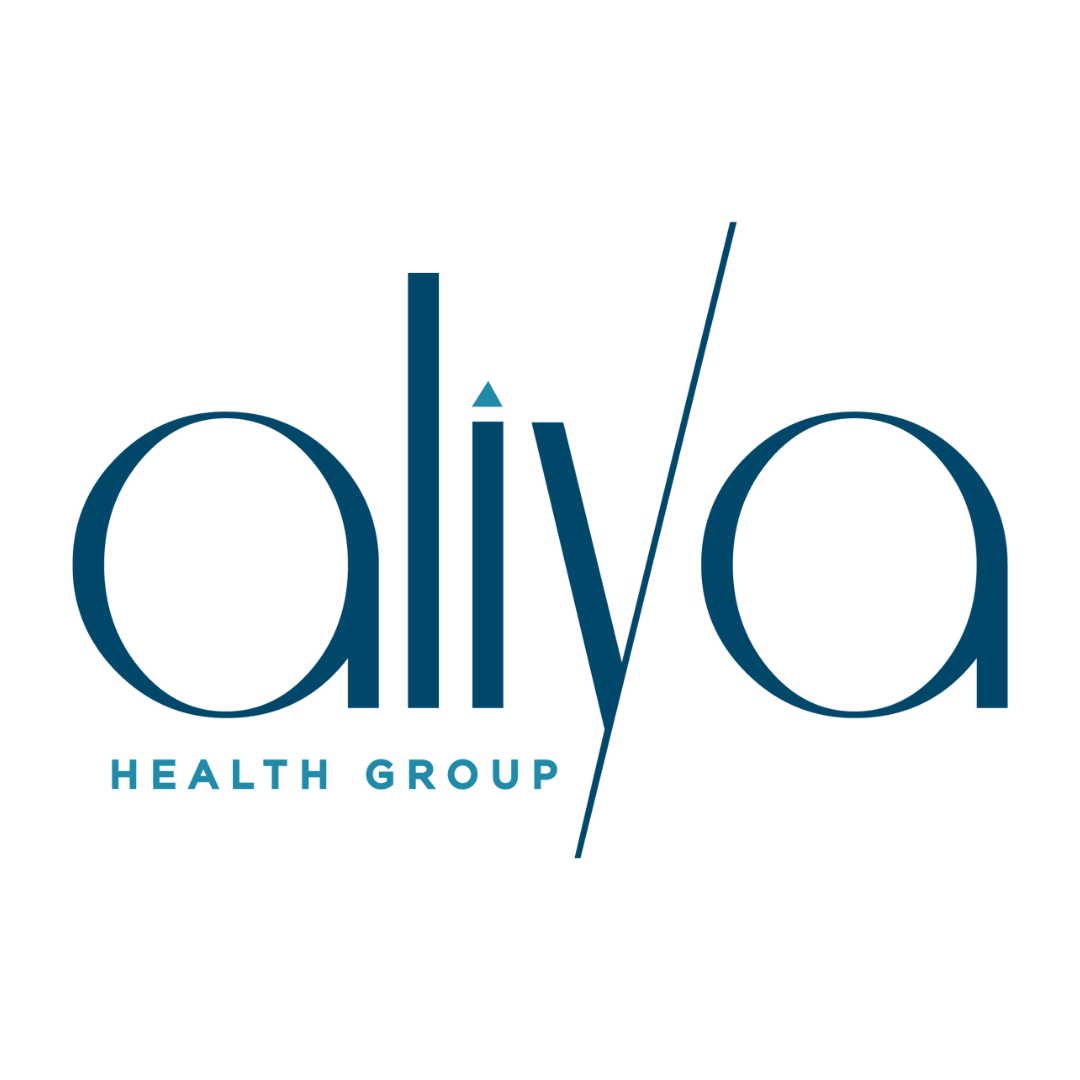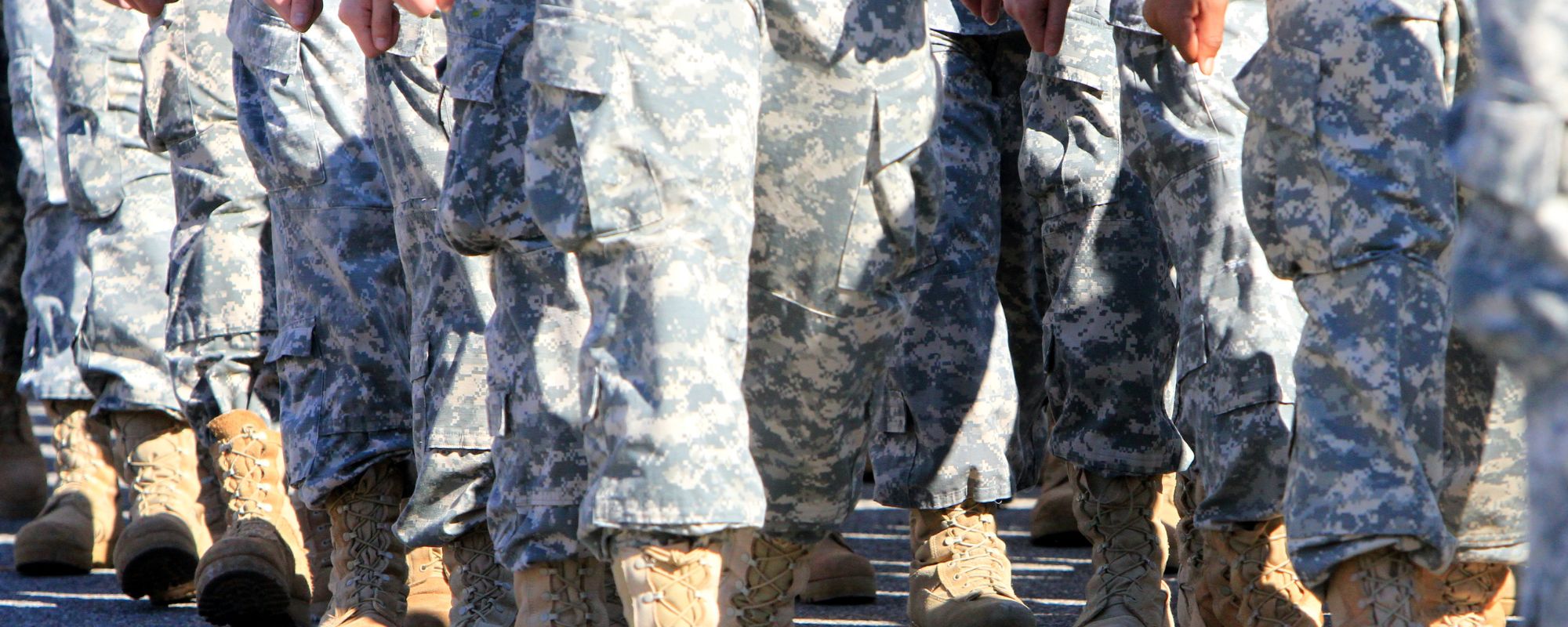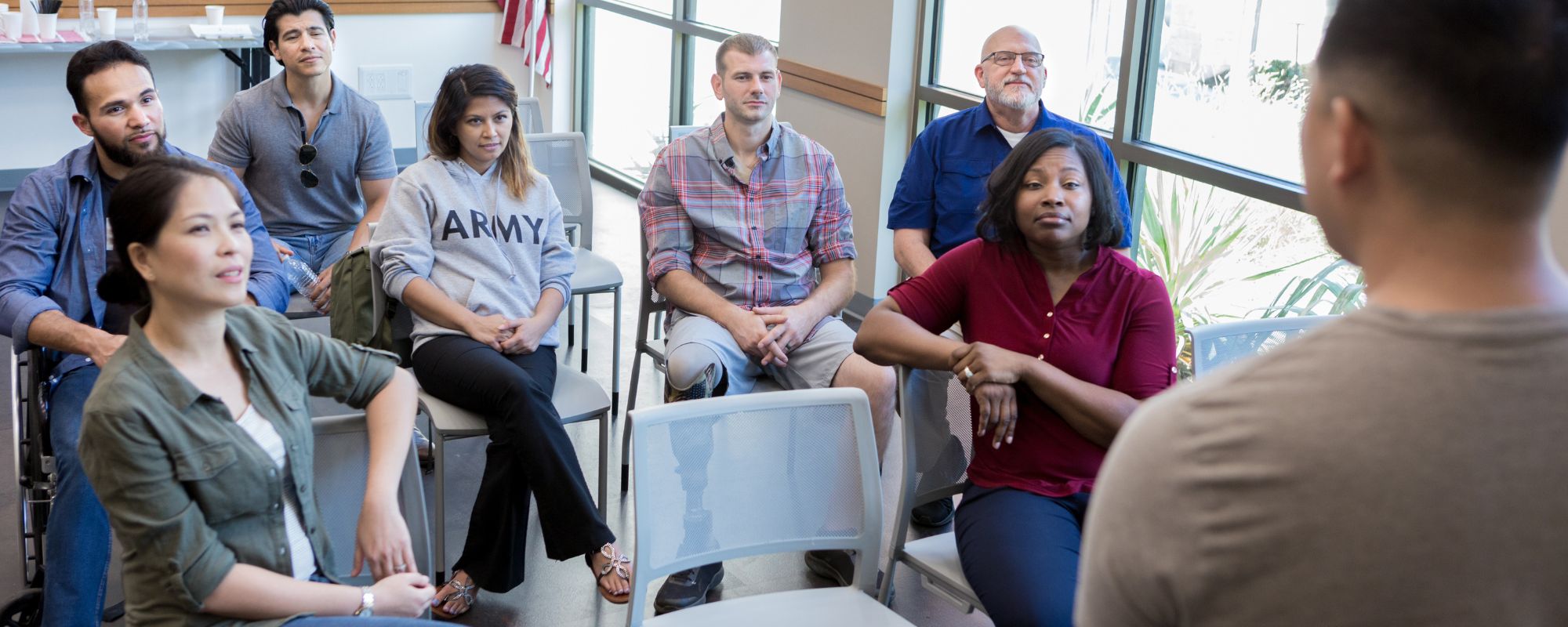A life in military service creates its own set of unique challenges that only veterans can fully understand. Deployment to active warzones, participating in combat, and exposure to life-or-death situations can leave lasting psychological impacts, sometimes leading to the development of conditions like Post-Traumatic Stress Disorder (PTSD).
Statistics show us that PTSD, for one, is more commonplace in the military vs. civilian communities, where seven out of 100 veterans will develop this type of stress disorder compared to six out of 100 civilians.
Nearly one-quarter of active-duty military personnel will develop mental health issues, and more than one in 10 will also be diagnosed with a substance use disorder, often started as a way to self-medicate mental health struggles.
Treatment for substance abuse, PTSD, and other mental illnesses is effective — and just one step away. But for many vets active and retired, one of the biggest barriers isn’t reluctance or lack of readiness — it’s the perceived cost and complexity of the veterans’ health care system.
As a veteran, your VA medical benefits are available to cover addiction and mental health treatment, but what is the full scope of them, and do you qualify for assistance? Read on to learn more about what your VA health benefits and veteran health coverage entail and how to take advantage of them.
What are VA Health Benefits?
Run by the U.S. Department of Veterans Affairs (VA), the Veterans Health Administration gives veterans access to VA hospitals, medical centers, and local clinics across the country and offers everything from regular physicals and preventative care to specialized treatment.
The VA also covers mental health and substance abuse treatment, whether you’re active military, recently discharged and reintegrating back into civilian life, or retired.
Mental and behavioral health care are considered essential health benefits under the Affordable Care Act, and federal law requires that veterans be provided with coverage for conditions like PTSD, depression, anxiety, or addiction to alcohol or drugs.
Who is Eligible for Health Insurance for Military Veterans?
Health insurance for military veterans often becomes a common point of confusion for current Armed Forces personnel, veteran, or their loved ones. How do you know if you qualify for VA care?
According to the VA, you’re eligible for VA benefits if:
- You served in the U.S. military, including active military, naval, or air service, and didn’t receive a dishonorable discharge.
- You served a continuous 24 months of active duty if you enlisted after Sept. 7, 1980, or entered active duty after Oct. 16, 1981.
- You’re a current or former member of the Reserves or National Guard.
- You served in specific locations and times during the Vietnam War.
- You meet basic service/discharge requirements and were exposed to toxins or hazards on duty (including veterans who served in Vietnam, the Gulf War, Iraq, Afghanistan, or other combat zones following the 9/11 attacks.
Since every veteran’s situation and time in service are unique, the VA encourages you to apply for benefits. Some special circumstances — like if you were discharged on disability, you received a Purple Heart or Medal of Honor, you’re a former POW, or you served in select locations during Vietnam — may qualify you for enhanced eligibility status.
What Mental Health and Addiction Services Does the VA Cover?
The scope of VA coverage for mental health and substance abuse is truly extensive and covers the continuum of care involved in entering rehab. VA-covered services may include:
- Medical detox: The initial step in treating a drug or alcohol addiction, detox takes place in the safe environs of rehab where clinical staff like doctors and nurses are at your side to manage and mitigate withdrawal symptoms you might experience.
- Inpatient/residential treatment: Severe addictions and mental illnesses can prevent some people from living independently or caring for themselves. Inpatient treatment is the opportunity to live on-site at a rehab center where you can focus entirely on recovery without triggers that can lead to relapse.
- Outpatient treatment: Programs like Partial Hospitalization Programs (PHP), Intensive Outpatient Programs (IOP), and standard outpatient enable you to receive therapy for addiction or mental health while living at home.
- Therapy and counseling: In rehab, research-based therapy is the foundation of inpatient and outpatient therapy. You might engage in individual treatment like cognitive-behavioral therapy (CBT), commonly used in rehab to reframe negative thought patterns and develop healthier habits and coping skills in day-to-day life.
- Medication-Assisted Treatment (MAT): Medicine is often prescribed in tandem with talk therapy. VA benefits cover FDA-approved drugs like naltrexone for alcohol use disorder or buprenorphine for opioid use disorder, among others.
- Additional treatment: The VA adds that couples/family, readjustment, military sexual trauma, and grief/bereavement counseling are also covered through VA benefits.
Get confidential help from our addiction and mental health treatment facilities located across the United States. Call to join one of our quality programs today!
Speak With Our Admissions Team
VA Benefits and Dual Diagnosis Treatment
Sgt. Kenny Naidoo of the Florida Army National Guard, writing for the VA, spoke on his experience with a co-occurring disorder.
“Addiction rarely occurs in a vacuum,” he says. “In most cases, there’s a bigger driver of alcohol or drug use. For some Veterans, this may simply be the difficult nature of adjusting back to life off-duty. I personally grappled with this, using alcohol and drugs to try to feel normal after returning home. But for many, mental health struggles drive substance use disorder.”
Sometimes, as Naidoo points out, a mental illness and addiction overlap. In veterans, the stress of combat, the challenges of reintegration or the weight of unresolved trauma can lead to a cycle where one condition fuels the other. You might drink to numb the hypervigilance of PTSD or develop a stimulant addiction to combat feelings of depression.
In fact, the National Institute on Drug Abuse notes that veterans with substance use disorder are three to four times more likely to receive a PTSD or depression diagnosis.
To treat both a co-occurring substance addiction and mental illness correctly, you’ll receive what’s called a dual diagnosis, when two conditions are treated on a specialized track. A necessary component of treatment, it’s also covered through VA medical insurance.
The VA Community Care Network
The Veterans Health Administration is the largest integrated health care system in the U.S., says the VA, offering care at 1,380 health care facilities (with 170 medical centers and 1,193 outpatient locations) to more than 9.1 million veterans annually.
There’s a common myth that VA benefits for mental health or substance abuse are only available at VA-run facilities. If a VA health center isn’t located near you or your chosen rehab center doesn’t offer the care you need, you can use your VA benefits at non-VA centers through the VA Community Care Network.
The network operates in five regions throughout the U.S.:
- Region 1 (East), from New England to North Carolina
- Region 2 (Midwest)
- Region 3 (Southeast and Puerto Rico)
- Region 4 (West, Southwest, Hawaii, Western U.S. territories)
- Region 5 (Alaska)
To use the Community Care benefit, start by contacting your VA provider and inquire how you can use your veterans health care to receive treatment at a partnered rehab center.
Can You Use VA Benefits with Private Insurance?
Many veterans have other types of insurance in addition to their earned VA benefits, either through a private plan through an employer, Medicare, Medicaid or TRICARE. You don’t need to choose private insurance or VA benefits — the good news is that you can have and use both. “Whether or not you have health insurance coverage doesn’t affect the VA health care benefits you can get,” notes the VA.
How they both work together depends on where you receive care:
- At a VA facility: The VA provides and pays for mental health or substance abuse care if it’s connected to military service. For non-service-connected conditions, the VA may bill your private insurance to help cover costs, so it’s always wise to provide your private health insurance information to the VA. This does not affect your out-of-pocket expenses, and any payment received from your private insurer helps to supplement the funds available for all veteran care, including any copays you might have.
- At a non-VA facility: If you receive care at a community provider without a VA referral, your private insurance, Medicare, or Medicaid would be the primary payer. If you receive care through a VA-approved Community Care referral, the VA will handle the payment to that provider.
The VA notes that it’s always a good idea to let your doctor know if you’re receiving additional care outside the VA network so they can stay abreast of the care you’re receiving. Overall, having multiple forms of insurance — especially signing up for Medicare when you turn 65 — gives you a safety net and flexibility from different avenues of care.
Looking for quality treatment for substance abuse and mental health that’s also affordable? Aliya Veterans treatment facilities accept most major insurance providers. Get a free insurance benefits check now!
Check Your Coverage
VA Benefits and Rehab FAQ
Can I lose my VA benefits for drug use?
No, you can’t lose your VA healthcare benefits for having a substance use disorder. The point of having your earned benefits is to help you obtain help for drug and alcohol addiction. However, certain circumstances leading to a dishonorable discharge may disqualify you from receiving VA benefits if substance abuse was attached to those reasons. For instance, VA benefits may be revoked if you’ve disobeyed orders, deserted or gone AWOL (absent without leave), or been convicted of a felony or sexual crime.
Applying for a discharge upgrade or requesting a VA character of discharge review can maximize your VA benefits eligibility.
Is substance abuse considered a VA disability?
Substance abuse on its own isn’t perceived as a military-service-connected VA disability which you can receive disability compensation. However, like we mentioned above about dual diagnoses, if you have a substance use disorder that’s secondary to another condition (like developing an alcohol addiction in response to service-oriented PTSD), it may be considered for VA disability benefits.
Do VA benefits cover my spouse or family members?
While your primary VA health benefits are for you, some programs can extend coverage to your family members. One example is the Civilian Health and Medical Program of the Department of Veterans Affairs. CHAMPVA, for short, provides healthcare coverage to the spouse or widow(er) and to the children of a veteran who is evaluated as permanently and totally disabled for a service-connected disability, or who died from one. Family members of uniformed active-duty, retired, or deceased service members may also be eligible for enrolling in the TRICARE network, which provides coverage for everything from detox to inpatient/outpatient treatment and care for drug and substance use disorders, plus family resources.
What is the first step to using my VA benefits for rehab?
Don’t let the opportunity to obtain benefits that are your right as an Armed Forces veteran fall by the wayside. Your first step is enrolling in the VA healthcare system on the VA’s official website. The site has information on your options for applying by phone, mail or in person.
Ensure that you have some documentation ready, like:
- Social Security numbers for you, your spouse and any dependents
- Your military discharge papers
- Any private insurance coverage ID cards
- Information on gross household income and past-year deductible expenses
Once enrolled, schedule an appointment with your VA primary care provider or a mental health specialist. This initial screening isthe next step to get a referral for the rehab care you need, whether it’s for mental health, substance abus,e or both.
VA Rehab through Everlight Behavioral Health
Navigating the complexities of a new system can be difficult to do alone, so we’re here to help. If you’re new to the VA system’s health insurance for military veterans, the last thing you should have to worry about is becoming an expert in insurance policies and administrative procedures,especiallyy if mental health or substance abuse issues have takencenter stages.
Our admissions coordinators are on hand 24/7/365 — that’s all day, every day of the year, even holidays — to help sort out the details about VA benefits and how you can get help through our rehab centers. We have experience working with the VA and can help you:
- Verify your benefits: We’ll work to help you gain an understanding of your VA health care eligibility and coverage, so you know exactly what your options are.
- Navigate the referral process: Where can you find care out of the VA network? We can help guide you through the steps of obtaining a Community Care referral from your VA provider.
- Explain your options: You have questions; we have clear, straightforward answers about Everlight’s programs — from medical detox and residential care to the range of therapies tailored for you, to aftercare options once you’ve completed rehab.
Most important is the full continuum of care we offer. Our clinical team members take pride in meeting you where you are in your journey, with compassion, insight, expertise, and care. No mental health or substance abuse issue is insurmountable. We’re here to help you heal and reclaim your life.
If you’re a veteran or a family member and need help getting started with VA benefits and entering rehab, contact us today and take that first step.
- https://www.ptsd.va.gov/understand/common/common_veterans.asp
- https://www.nami.org/your-journey/veterans-active-duty/
- https://nida.nih.gov/publications/drugfacts/substance-use-military-life
- https://www.congress.gov/bill/115th-congress/house-bill/918
- https://www.hhs.gov/answers/health-insurance-reform/does-the-aca-cover-individuals-with-mental-health-problems/index.html
- https://www.va.gov/health-care/eligibility/
- https://www.va.gov/health-care/health-needs-conditions/mental-health/
- https://news.va.gov/45281/for-a-successful-recovery-treatment-of-dual-diagnosis-is-paramount/
- https://www.va.gov/resources/va-health-care-and-other-insurance/
- https://www.va.gov/family-and-caregiver-benefits/health-and-disability/
- https://www.va.gov/family-and-caregiver-benefits/health-and-disability/champva/
- https://www.va.gov/VADODHEALTH/TRICARE.asp
- https://www.va.gov/health-care/how-to-apply/


- Pill Mills: What Veterans Need to Know About a Dangerous Practice - January 28, 2026
- Trauma and Addiction: Understanding the Connection and Paths to Healing - January 27, 2026
- Rehab Centers for Veterans: Healing from PTSD and Addiction - January 26, 2026













